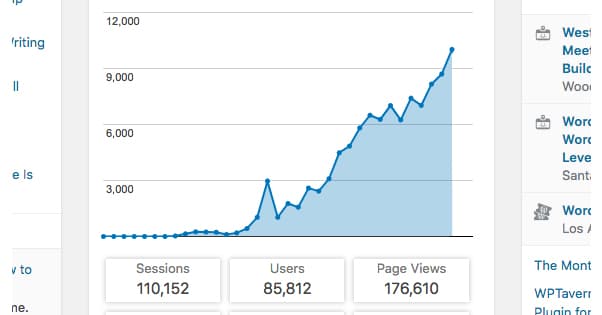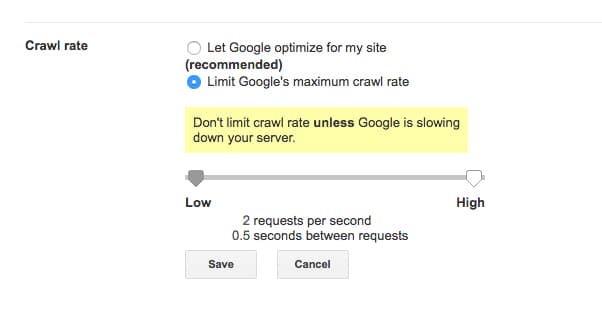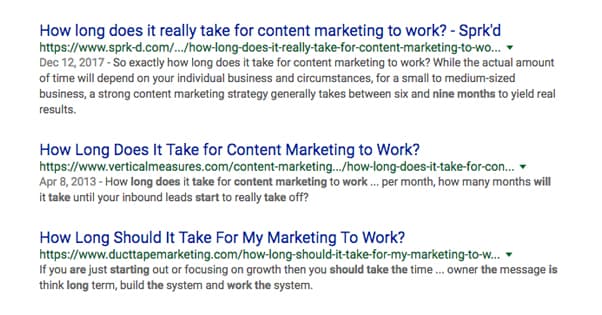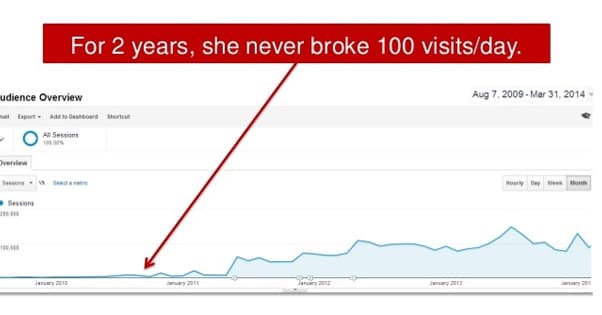How Long Does Content Marketing Take to Start Working?
Published by Kenny Novak • Content Marketing • Posted September 6, 2018 ContentPowered.com
ContentPowered.com
Content marketing. To some, it’s a way of life. To others, it’s a silver bullet that gives them the edge over their competition. To yet others, it’s a necessity required to even compete in a niche.
How long does it take for content marketing to show results, when you’ve gone from nothing to a freshly created blog?
The answer, as should come as no surprise, is “it depends.” There are a hundred little factors that come into play. Let’s talk about all of them, shall we?
Google Indexing Delay
Let’s say that we’re operating in a brand new niche with no competition at all whatsoever. Somehow, there is already traffic searching for results within this niche, but no one has thrown up a blog or started a web forum dedicated to it. You have a storefront, but you’re just now starting a blog. You publish your first blog post. What happens?
You would think that you would immediately become the number one ranked result in this non-competitive niche. After all, no one else even exists to outrank you. All of the search traffic that was finding nothing will now find you.
This is true to an extent, but there’s one delay you can’t get rid of. Google has to find your content and index it, and add that content to their overarching data so it can appear in the search results. This takes time. The exact amount of time it takes will vary depending on a few factors, like whether or not you’ve done anything to help your content get discovered.
If you submit a sitemap to Google, chances are they will have it indexed within a week, and more likely within a day or two. If you have zero links to your content, don’t post it on social media, and don’t submit a sitemap, you have to wait until Google finds and indexes your site again, which could take weeks. So there’s the first amount of time we can use as an answer: at least a day or two before content marketing starts working.
Of course, this answer is meaningless, since it involves a situation that doesn’t exist. You’re never going to find a niche with existing traffic but zero existing content or competition. It simply doesn’t exist.
Competition Within a Niche
Competition within your niche will have a pretty big impact on how long it takes for your content marketing to be effective. For example, if I wanted to start a brand new SEO-focused blog from scratch, with no prior resources and no name recognition, it might take me years of effort to build it to the point where it even has a minor recurring readership.
The problem here is that a high volume of high quality competition makes it extremely difficult to rank a new website. You have to position your website to be comparable to the competition. When you have five pieces of content and your competition has 400 a year, you have a lot of catching up to do. The only way you could outrank them is to find a specific topic they haven’t covered and cover it yourself. Even then, you only outrank them because they aren’t strictly speaking competition for that keyword. It doesn’t make the rest of your site rank any better. You get the fruit of that content marketing if that topic has traffic, but if it doesn’t, your ranking is meaningless.
The more competition a niche has, the harder it is to rank even on the first page of Google. This can vary up the amount of time it takes for a piece of content to rank competitively as anywhere from a week to several years, at which point the content is probably obsolete.
Uniqueness and Value of Content
One problem I often see with newcomers to content marketing is a sort of negative feedback loop. Put yourself in the shoes of a small business owner who has no idea what marketing online really is, but knows from a few scattered blog posts and old conversations that running a blog is a good way to grow.
As this hypothetical small business owner, you start by throwing up a blog. You at least follow the basic best practices and implement basic SEO, make sure it’s on your main domain, and so on. You publish a blog post and write a few more, scheduled to be posted every couple of weeks. They’re pretty good, you think. 500 whole words on a topic you find pretty interesting.
A week goes by, and then another. A month passes, and then another. You’ve seen zero traffic to your blog posts, and zero additional conversions because of it. Your website’s Google rankings haven’t changed. What gives?
In order for content to bear fruit, you need to produce blog posts that are both unique and high quality. In my experience, this means at least 1,500 words on a narrow topic, covered with authority, with links to sources and further reading. That’s a tall order for someone who barely writes anything that isn’t a business proposal, let alone a regular blog.
Throw on top of that the keyword research, competitive analysis, and other roadblocks to success with content, and it’s easy to see how the loop gets started. Our small business owner doesn’t know all of this. They feel that they produced a good piece of content, or at least something that’s good enough, and it should be working by now! Since it isn’t, they conclude that content marketing either has too slow a growth rate to be viable, or is a scam, and decide to abandon it. I can’t tell you the number of small businesses I’ve seen that have a blog with half a dozen old posts from 2011 on them, abandoned when it didn’t immediately bring in conversions and viral success.
The loop discourages business owners from investing in a blog when that blog isn’t bringing anything in. Rand Fishkin mentions this as SEO Slog. The gap between the effort invested and the minimal returns is incredibly discouraging and leaves far too many potential marketers languishing, deciding it isn’t worth the effort after all.
The Snowball Effect
In the same vein, content marketing snowballs. One blog post, no matter how good it is, is pretty unlikely to have any noticeable effect. A dedicated content marketing plan, with regular posting, link building, high quality content paid for from a freelancer, and attention to both keyword research and SEO can have an impact.
Even still, it takes a while for a site to get off the ground. It takes several months to start seeing returns, and even in the early days, those returns are going to be fairly minimal. Now, some businesses will find even a single conversion to be worth the effort. Others, particularly those who were taken by an expensive consultant who doesn’t deliver the good, might have a deep hole to climb out of before the conversions outweigh the investment.
It doesn’t help that the initial investment can be steeper than you might realize. You have to invest in the blog CMS you’re using, in the SEO setup, in the keyword research, in paying for the writing. Many of these investments are larger at the start of your marketing efforts. You only need to do your major keyword research once, right? After that it’s all about maintaining the accuracy of the data, supplementing it and pruning it, not re-doing the entire thing.
The initial investment is steep, the initial returns are infinitesimal, and it takes months to snowball to the point where it even begins to break even. This is assuming all else goes well; you’re producing great content, your SEO is on point, and you’re getting high quality links.
Link Building Efforts
Link building is more important than ever before, but there are a ton of pitfalls and traps for new marketers.
There’s a bit of a stereotypical college experience wherein you’re discussing ways to make money with your friends, and you hit upon a brilliant idea. Why not just ask a few people to give you $5? Give them tips on asking their friends to give them $5, with the assumption that when those people are given $5, they pass $1 along to you for the tips. Soon you can build a network with tons of money coming in for no effort at all! Then you sketch it out and realize you’ve invented a pyramid scheme.
To a certain extent, you can see this with the various issues people encounter with regards to Bitcoin. Over the last several years, Bitcoin has encounters a whole manner of different scams and problems, many of which are left unresolved. People lose hundreds of thousands of dollars to cut-and-run scams, and there’s no way to recover their money, because it’s not stored in any bank and is not insured in any way. Slowly, through trial and error, Bitcoiners are discovering why existing financial regulations are actually a good thing.
The same goes for newcomers to SEO. You know the importance of links, so you think of a way to get links. Why not build a bunch of tiny free WordPress sites and have them link to your site? Well, that’s tiered link building and it will get you penalized. Why not pay some people to link to you? Well, Google hates money influencing search, so they penalize that too. There’s a whole range of pitfalls you can fall into.
Link building, to me, is something of a force multiplier for content marketing. A small blog building a few links will eventually end up 2x as powerful as it was before those links. A blog with 5x as much content building those same links will end up 10x as powerful, due to the weight of their content. Building more links builds more power, and that power is defined by the existing content.
You Definition of Value
Of course, all of this comes down to one subjective measurement: what do you consider value? At what point can you look at your site, the result of your content marketing, and say “yeah, that worked”?
For some people, it’s the moment the first conversion comes in that can be traced back to a blog visitor. One single conversion is all it takes to decide that content marketing works, and to continue the investment. This is a great attitude to take, but for many companies, one conversion is a drop in the bucket and isn’t seen as enough value to be more than a fluke.
For other people, it needs to be enough conversions to outweigh the initial investment. This means the time until content marketing bears fruit for them will depend on the scale of their investment, the size and volume of their conversions, the quality of their persuasive calls to action, and a thousand other factors. It could be a few months, it could be a few years, and there’s no way to predict it.
For still others, nothing short of ranking #1 for every search term they can think of, nothing short of a million conversions, is going to be enough to satisfy them. For these people, the amount of time it takes for content marketing to work is basically infinite. There’s no guarantee their conditions will ever be met, let alone in a reasonable time.
So how long does it take for content marketing to start working? Well, as long as your expectations are reasonably, you’re looking at a few months to a few years.










